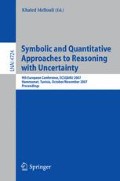Abstract
Dung’s abstract theory of argumentation has become established as a general framework for non-monotonic reasoning, and, more generally, reasoning in the presence of conflict. In this paper we extend Dung’s theory so that an argumentation framework distinguishes between: 1) attack relations modelling different notions of conflict; 2) arguments that themselves claim preferences, and so determine defeats, between other conflicting arguments. We then define the acceptability of arguments under Dung’s extensional semantics. We claim that our work provides a general unifying framework for logic based systems that facilitate defeasible reasoning about preferences. This is illustrated by formalising argument based logic programming with defeasible priorities in our framework.
Access this chapter
Tax calculation will be finalised at checkout
Purchases are for personal use only
Preview
Unable to display preview. Download preview PDF.
References
Amgoud, L.: Using Preferences to Select Acceptable Arguments. In: Proc. 13th European Conference on Artificial Intelligence, pp. 43–44 (1998)
Amgoud, L., Parsons, S.: Agent Dialogues with Conflicting Preferences. In: Meyer, J.-J.C., Tambe, M. (eds.) ATAL 2001. LNCS (LNAI), vol. 2333, pp. 190–205. Springer, Heidelberg (2002)
Atkinson, K.M., Bench-Capon, T.J.M., McBurney, P.: Computational Representation of Practical Argument. Synthese 152(2), 157–206 (2006)
Bench-Capon, T.J.M.: Persuasion in Practical Argument Using Value-based Argumentation Frameworks. Journal of Logic and Computation 13(3), 429–448 (2003)
Bondarenko, A., Dung, P.M., Kowalski, R.A., Toni, F.: An abstract, argumentation-theoretic approach to default reasoning. Artificial Intelligence 93, 63–101 (1997)
Brewka, G.: Reasoning about priorities in default logic. In: Proc. 12th National Conference on Artificial Intelligence (AAAI 1994), pp. 940–945 (1994)
Dung, P.M.: On the acceptability of arguments and its fundamental role in nonmonotonic reasoning, logic programming and n-person games. Artificial Intelligence 77, 321–357 (1995)
Kakas, A., Moraitis, P.: Argumentation based decision making for autonomous agents. In: Proc. Second international joint conference on autonomous agents and multiagent systems, pp. 883–890 (2003)
Modgil, S.: Hierarchical Argumentation. In: Proc. 10th European Conference on Logics in Artificial Intelligence, pp. 319–332 (2006)
Modgil, S.: Value Based Argumentation in Hierarchical Argumentation Frameworks. In: Proc. 1st International Conference on Computational Models of Argument, pp. 297–308 (2006)
Prakken, H., Sartor, G.: Argument-based extended logic programming with defeasible priorities. Journal of Applied Non-Classical Logics 7, 25–75 (1997)
Author information
Authors and Affiliations
Editor information
Editors and Affiliations
Rights and permissions
Copyright information
© 2007 Springer-Verlag Berlin Heidelberg
About this paper
Cite this paper
Modgil, S. (2007). An Abstract Theory of Argumentation That Accommodates Defeasible Reasoning About Preferences. In: Mellouli, K. (eds) Symbolic and Quantitative Approaches to Reasoning with Uncertainty. ECSQARU 2007. Lecture Notes in Computer Science(), vol 4724. Springer, Berlin, Heidelberg. https://doi.org/10.1007/978-3-540-75256-1_57
Download citation
DOI: https://doi.org/10.1007/978-3-540-75256-1_57
Publisher Name: Springer, Berlin, Heidelberg
Print ISBN: 978-3-540-75255-4
Online ISBN: 978-3-540-75256-1
eBook Packages: Computer ScienceComputer Science (R0)

